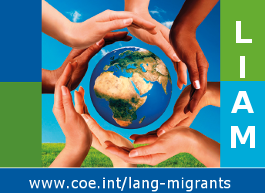Linguistic goodwill
Contact with languages we do not know, which we hear being used, see written in scripts that differ from our own or which we have to use ourselves to a very limited extent (a few words) usually triggers various reactions ranging from surprise or amusement to rejection. By "linguistic goodwill" we mean the attitude which consists of showing an interest in unknown languages, admiring them as human creations, without making any value judgments or classifications, and being ready to establish communication with those who speak them, whoever they may be.
Ethnocentrism
These unfamiliar languages are therefore often regarded as exotic or irrational and grating in sound or even ugly, while their speakers are often regarded as noisy or loud, especially when the languages are used on our home territory, where they may be seen as intrusions. Reactions of this kind are frequent when the speakers are of modest means, in which case it is the users of the languages as much as the languages themselves which are rejected. Such reactions are particularly prevalent in respect of adult migrants, who may end up undervaluing their language, hiding it and not passing it on.
They reflect a banal form of ethnocentrism, which can apply to many other expressions of otherness such as clothing, table manners and standards of politeness, etc. They are therefore a potential breeding ground for racism and discrimination.
Favourable disposition towards languages
All forms of intercultural education have a duty to highlight these reactions and urge individuals to control them, drawing on the most objectivised data possible, which go beyond the dominant social representations and automatic ethnic stereotypes. This approach, involving a kind of reflective re-assessment, should lead to linguistic goodwill, ie positive curiosity for the unknown and pleasure in discovery. In terms of their diversity, languages are among the most exceptional creations of homo sapiens and they deserve admiration or, at least, interest. Far from being mere marks of identity, they also reflect human beings’ ability to develop infinitely varied modes of communication from the same raw material: human sounds.
Education in goodwill
The plurilingual education approach itself involves teaching resources for developing classroom activities that generate an attitude of linguistic goodwill. They are based on the perception of the diversity of languages, in the form of discovery of language and languages: these practical forms of introduction to linguistics are primarily intended for young learners. However, they probably would also be useful for more advanced learners. These activities involving the observation and manipulation of various linguistic forms should help individuals recognise the unitary functioning of languages and make contact with other languages less disconcerting.
In terms of attitudes and behaviour, for instance, this involves learning:
- not to be shocked on hearing unfamiliar sounds;
- not always to think that the speakers of foreign languages speak too loudly or inarticulately;
- to make an effort to speak clearly and more slowly so as to facilitate interaction with non-native speakers;
- to mediate or correct what the other person says in a discreet, non-judgemental manner;
- […]
It could also concern repertoires and stress the need:
- not to show too great surprise on finding out that a speaker has a particular language in his or her repertoire;
- to equate scope of repertoire with “intelligence”;
- to adopt a comparative assessment approach for repertoires;
- to adopt the code-switching used by the other speaker (when possible);
- not to show off one’s repertoire gratuitously but to use it playfully with the other speaker to generate complicity.
- […]
This linguistic civility is a full part of the objectives of plurilingual and intercultural education.
JCB
Related resources
- Concept paper : The role of languages in policies for the integration of adult migrants, 2008, Jean-Claude Beacco
EN FR
- Languages and language repertoires : plurilingualism as a way of life in Europe, 2004, Jean-Claude Beacco
EN FR
- Linguistic diversity and new minorities in Europe, 2004, Ingrid Gogolin
EN FR
- Living together in diversity - Linguistic integration in Flanders, 2008, Reinhilde Pulinx
EN FR
- Report of the Seminar on The Linguistic integration of Adult Migrants, 2008, Language Policy Division
EN FR
- White Paper on Intercultural Dialogue - Living Together As Equals in Dignity, 2008, Council of Europe
EN FR
- Guide for the development of language education policies in Europe, 2007, Jean-Claude Beacco, Michael Byram, Council of Europe (see chapter 4)
EN FR



